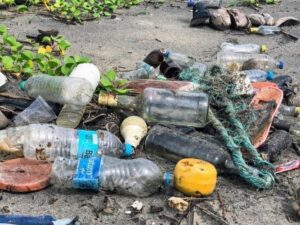
WHY ZERO WASTE MATTERS?
19.06.2021
Zero Waste is one of the fast growing, and easiest climate action strategies that people can implement even today to immediately reduce greenhouse gas emissions.
What is the Zero Waste movement about?

Recycling only works when there’s someone on the other side of the equation.
It seems that role of everyone in environmental problems is finally getting the attention it needed. You have probably been recommended to use less plastics, and you might even know that micro plastics are ending up later in our food chain. Zero Waste is strong environmental movement that is gathering steam. So, what is the Zero Waste movement about? What would you need to start a zero-waste lifestyle?
The Zero Waste approach seeks to maximize recycling, minimize waste, reduce consumption and ensures that products are made to be reused, repaired or recycled back into nature or the marketplace.
Even if you’re already recycling, it isn’t enough.
Just to compare, in 2016, 47% of waste was recycled or composted, but the other 53% either ends up in landfills or is burned. The reason is because the recycling is pretty expensive, or most of items made of a mix of materials, and are hard to recycle. Moreover, there is a limit to how many times materials can be recycled.
The blue bin may be preferable to the trash can, but recycling still has a waste footprint – and it requires someone on the other side of the equation to use what you toss. A better goal is simply to have less stuff.
Paper can usually be recycled only five to seven times, and plastics only once or twice.
We can recycle paper five to seven times, but plastic only once or twice. And when plastics are coming to landfills, it takes almost 1000 for decomposing, with additional leaking of hazardous chemicals into the ground.
Another places where our waste ends up often are oceans and other waters, where plastic can’t naturally decompose, under the force of waves plastic are breaking down into microplastics. Small pieces are later often eaten by sea animals, and might even appear in our food chain.
The main goal of zero waste movement is to reduce the pollution of the earth by minimizing the use of waste. In other words, this movement is trying to avoid making any waste that cannot be recycled or biodegraded.
There are 5 main principles of Zero Waste movement:
- Refuse. Always refuse using single plastic and plastic freebies, things such as plastic straw, plastic shopping bag, free pen, should be avoided. Instead, try to find eco-friendly alternatives, such as bamboo straws, paper bags, etc.
- Reduce. Minimize the number of plastic products in your daily life. You can easily subscribe for Kiwi Eco Box and start receive all essential products on monthly basis to slowly build your zero-waste routine.
- Reuse. Look at the products you want to throw, think twice maybe you can reuse it, or give it to someone who might need it, or maybe sell it online. Another way to reuse products is by repairing them, if you live in a big city you probably have a repair shops around for clothing, shoes, as well as electrical appliances.
- Recycle. Recycle products that can’t be reused, remember that you need to separate the different materials.
- Rot. For the organic waste, after you’re done using it, you should leave it to rot. The best way to let your organic waste to rot is through creating own compost pile.
Anyone living a Zero Waste lifestyle will say it’s all about beginning with small life changes. By doing things like buying secondhand, using reusable containers, and composting food scraps, anyone can significantly reduce the amount of trash they produce on a regular basis.
Going Zero Waste is obviously a very large and demanding task. If you want to help keep trash out of landfills, but aren’t in the position to commit entirely to Zero Waste, that’s okay! There are still so many things you can do to help minimize the problem. Whether it’s using a reusable water bottle, or donating your clothes instead of throwing them out, every small step counts! Start small:
- Reduce and reuse first
- Refuse single use plastic

To summarize zero-waste movement is important to say that is something more than just recycling products and avoiding buying unnecessary items. It’s also about changing your mindset and habits. Follow Kiwi Eco Box for staying updated about latest zero waste news and tips.
Love, Kate and Nataly






